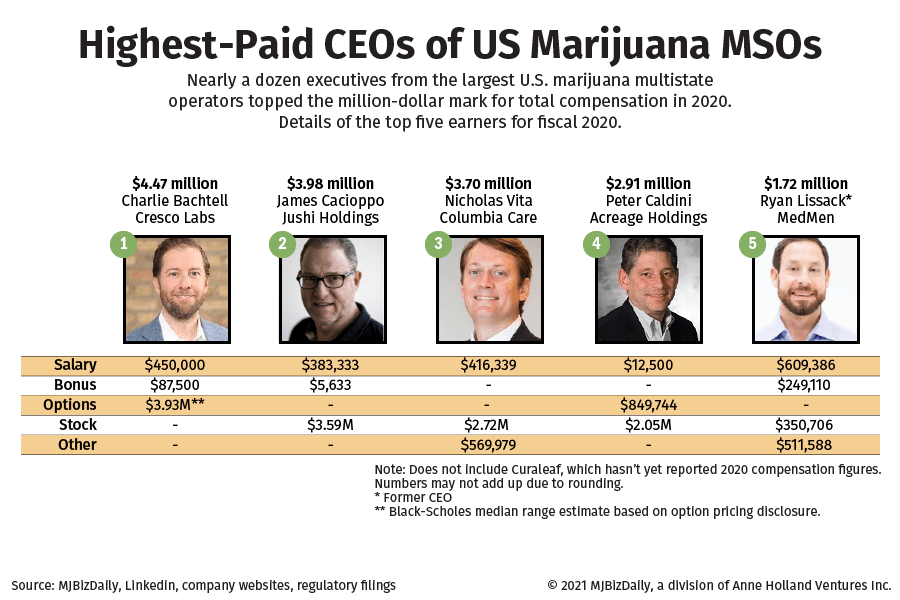Executives for cannabis producer Canopy Growth received more than 4 million Canadian dollars ($3.2 million) in cash bonuses after making “solid progress in the year,” according to a regulatory filing, even as the company lost CA$1.7 billion and laid off hundreds of workers.
The Smiths Falls, Ontario-based company disclosed the executive compensation figures for fiscal year 2021 in a proxy statement sent ahead of its annual general meeting, scheduled for Sept. 14 via webcast.
The executives’ compensation packages consist of salary as well as bonuses awarded as part of the company’s short- and long-term incentive plans.
For fiscal 2021, which ended March 31, the board approved short-term incentive plan bonuses totaling CA$4 million for five of the company’s top executives.
The company’s long-term incentive-plan (LTI) bonuses, typically granted annually in March, were awarded June 9, 2021.
The LTI bonuses were not reported in the total compensation table because they were issued after the fiscal year ended.
“On a go forward basis, we have determined to fix the regular timing of our annual LTI grants to occur in June of each year, beginning in Fiscal 2022,” the proxy noted.
“As such, no LTI awards were granted in Fiscal 2021, with the prior LTI grants having been made in late March 2020 at the end of Fiscal 2020.”
In an emailed statement, a company spokesperson told MJBizDaily that “Canopy Growth’s executive compensation supports our strategy of attracting and retaining top talent that is necessary to support the company’s ambitious growth plans and is structured to ensure close alignment between the interest of shareholders and leadership.”
Bonuses
The company uses four performance measures related to corporate objectives to help guide short-term bonus payouts where executives earn an annual cash bonus.
Free cash flow has the heaviest weighting (50%) among the performance measures, followed by net revenue (20%), adjusted EBITDA (20%) and individualized objectives (10%).
The company failed to meet its fiscal 2021 goals for net revenue and adjusted EBITDA, but the goals for free cash flow and individualized objectives were achieved.
According to the proxy, Canopy aimed for net revenue of $455 million but came in at $414 million.
Free cash flow was negative $478 million, or half the shortfall the company anticipated.
Adjusted EBITDA, which serves as a measure of profitability, came in at negative $258 million, a slightly worse performance compared with the company’s objective of negative $246 million.
Canopy’s short-term cash bonuses amounted to:
- CA$2.2 million for David Klein, CEO.
- CA$579,000 for Mike Lee, chief financial officer.
- CA$659,000 for Rade Kovacevic, president and chief product officer.
- CA$360,000 for Julious Grant, chief commercial officer.
- CA$351,000 for Phil Shaer, chief legal officer.
According to the proxy statement, Canopy’s compensation committee “affirmed that the executive leadership team performed well in progressing the company’s revised CPG strategy and reorientation towards a path of reduced financial losses and sustained success, all while acknowledging the challenging environment created by the COVID-19 pandemic.”
The executives also received grants on June 9 as part of their annual LTIP.
Those ranged from 22,352 options and 11,176 share-based awards for Shaer to 139,488 options and 69,744 share-based awards for Klein.
The share-based awards were granted in the form of performance share units (PSUs).
“The number of PSUs granted represents 100% of the target number of PSUs. The minimum PSU award is equal to 50% of the target number of PSUs, and the maximum PSU award is 150% of the target number of PSUs,” the filing noted.
Going forward, the filing adds, half of the executives’ long-term incentive grants will consist of restricted share units and performance share units, and in fiscal 2021, “no performance conditions were imposed on share unit awards granted in March 2020 due to the difficulty in establishing reasonable performance metrics due to the impacts of the COVID-19 outbreak.”
Salary bumps
The executives, except for CEO Klein, received modest raises between CA$14,000 to CA$25,000.
Klein’s salary was maintained at CA$1.2 million.
The CEO’s total compensation for the year amounted to CA$3.7 million, consisting of salary, the short-term bonus of CA$2.2 million plus CA$127,000 in “other” compensation.
The compensation, as noted earlier, does not include the bonus awarded under the company’s long-term incentive-plan, since it was issued just after the fiscal year came to a close.
Last year, Klein’s compensation was valued at CA$45 million.
The “other” compensation consists of an annual perquisite allowance of CA$118,000, with the remainder going toward the CEO’s tax-return preparation.
According to the proxy, Klein’s total cash compensation was “consistent with solid progress in the year.”
The ratio of the annual total compensation of the CEO to the median annual total compensation of all other employees was 63-to-1.
Canopy’s median employee received approximately CA$58,000, more than the vacation pay for the company’s president, which amounted to CA$45,700, according to the proxy statement.
Shaer earned the largest raise, at 7.8%.
Canopy collected payroll subsidies from the federal government worth CA$11 million as part of Canada’s corporate COVID-19 relief program.
The company underwent significant restructuring during fiscal 2021, resulting in the closure of facilities in St. John’s, Newfoundland and Labrador; Fredericton, New Brunswick; Edmonton, Alberta; Bowmanville, Ontario; the outdoor grow operations in Saskatchewan; as well as some production facilities.
Roughly 220 full-time positions were eliminated as part of the restructuring, according to a separate regulatory filing.
Board compensation
In fiscal 2021, three of Canopy’s board members each received compensation ranging from CA$253,758 to CA$352,230.
Chair Judy Schmeling was the top earner.
Three other members voluntarily waived their right to receive director compensation.
Bill Newlands and Robert Hanson waived their director compensation from fiscal 2020 onwards. (Hanson waived his compensation from June of fiscal 2020 onwards.)
James Sabia voluntarily waived his right to receive the board-approved director compensation from fiscal 2021 onwards.
The Canopy spokesperson told MJBizDaily in an email it is common practice for board members occupying seats held by large shareholders to not take compensation.
Canopy shares trade as WEED on the Toronto Stock Exchange and CGC on the Nasdaq exchange.
Matt Lamers is MJBizDaily’s international editor, based near Toronto. He can be reached at matt.lamers@mjbizdaily.com.






